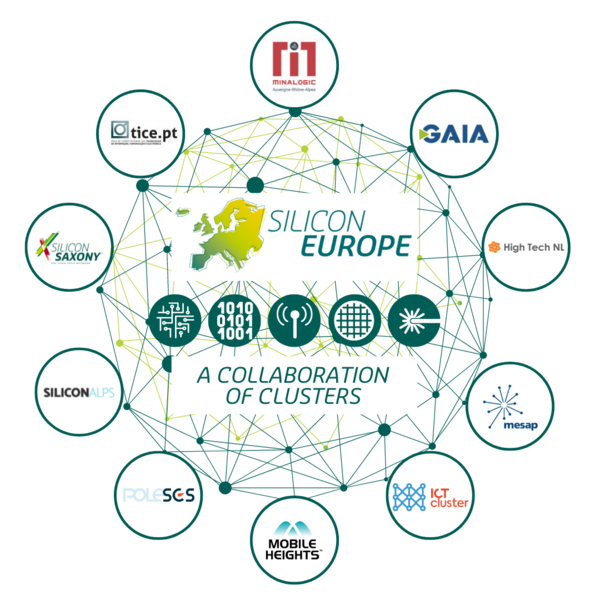Silicon Eurocluster
(2022 - 2025)
The Silicon Eurocluster project aims to achieve greater European self-sufficiency, with increased competitiveness and resilience in the electronics value chain, with specific attention to SMEs.
The existing Silicon Europe strong alliance of leading micro- and nanoelectronics, enriched by competencies from Bulgaria, will synergise the updated European industrial strategy to boost its value chains to be greener, more digital and resilient against disruption. Silicon Eurocluster wants to place Europe in a leading position in development and production of Micro- and Nanoelectronics (key enabling technologies) by harnessing the teamwork of existing high-potential clusters.

Project description
The Silicon Eurocluster project aims to achieve greater European self-sufficiency, with increased competitiveness and resilience in the electronics value chain, with specific attention to SMEs. The semiconductor industry, a foundation of all electronics, impacts the entire European Value Chain. Its independence will build a strong basis for a greener and more digital economy. Several regions cluster the technological expertise and resources of Europe’s leading SMEs, industries, and research organisations in innovative electronics. A strong alliance of leading micro- and nanoelectronics regions already exists – The Silicon Europe Alliance. Enriched by competencies from Bulgaria, the alliance aims to synergise the updated European industrial strategy: to boost its value chains to be greener, more digital and resilient against disruption. Silicon Eurocluster will initiate the following actions:
- Develop and strengthen value chain interlinkages in the EU single market to enhance the resilience of the EU industrial ecosystem
- Increase strategic autonomy in the most critical supplies and technologies of these ecosystems by building capacities
- Adopt processes and technology to support the transformation to a greener and more digital economy
- Attract talent to stimulate and scale up the workforce
- Go international, reconnect and boost access to global supply and value chains.
Silicon Eurocluster wants to place Europe in a leading position in development and production of Micro- and Nanoelectronics (key enabling technologies) by harnessing the teamwork of existing high-potential clusters in Spain, Portugal, France, Italy, Germany, Austria, Bulgaria, Sweden, and the Netherlands. Extending the collaboration among the clusters to a registered European cluster association will have a major impact on the global competitiveness of Europe’s electronics systems. The project ambitions provide direct support to at least 50 SMEs via financial support (25 green vouchers and 25 demo projects) & support them in internationalization, innovation, networking and training towards digitized and green.
In the project, we envisage to have around 300 organisations to participate to the Silicon Eurocluster activities concluding to 20 business partnerships signed by the companies supported, at least 50 SMEs will receive funding via the FSTP scheme (25 green vouchers and 25 demo projects) to support them in internationalization, innovation, networking and training towards digitized and green. Additionally, 20 cluster employees will be trained, and 15 SME will benefit from Internationalisation support. The project will run until February 2025 and has a budget of more than 1.5 million euros with a funding of about 1.4 million coming from the European Union. 1.05 million will be addressed to financially support European Small and Medium Enterprises.
Considering the global competition especially in times of crises like the current corona crisis, and considering the great assets that the European electronics industry already possesses, there is an excellent chance to succeed in maintaining, structuring and strengthening this very important electronics value chain in Europe. The rationale of our project proposals are as follows:
- semiconductors and all related electronics value chains are crucial for myriad industries (not only automotive). Design and production are necessary to have technology sovereignty
- European cooperation is key for long-term success
Having (and keeping) a semiconductor industry requires long-term commitment, including during difficult times. In this Silicon Eurocluster, 9 cluster members of the Silicon Europe Alliance are partnering together with a Bulgarian ICT to achieve the desired scope:
- Improve the resilience of the EU industrial ecosystems by developing value chains interlinkages in the EU single market;
- Build capacity to increase strategic autonomy in the most critical supplies and technologies of the relevant ecosystems, including upscaling manufacturing facilities;
- Reinforce transformation into a greener and more digital economy;
- Stimulate and re-skill the workforce whilst attracting talents;
- Reconnect and boost access to global supply and value chains.
Our strong project partnership has chosen the adoption of processes and technologies to reinforce transformation into a greener and more digital economy as the key focus of our Silicon Eurocluster project. We aim to stimulate green markets, support green enterprises, support our electronics companies adopt green processes, integrate considerations from the circular economy, and improve resource efficiency, while at the same time boosting the uptake of solutions by all businesses.
Contact project coordinator
MINALOGIC
3, Parvis Louis Néel
F-38054 Grenoble Cedex 9
France
Web www.minalogic.com
![]()
Laure de Tassigny
European projects officer
Tel.: +33 7 78 38 14 40
E-mail: laure.de.tassigny@minalogic.com
Consortium
The Silicon Eurocluster project consortium consists of 10 strong partners:

